
Equipped with state-of-the-art laboratories that provide students with hands-on experiences to bridge theory and practice
With more than 300 000 learners in South Africa eligible to study at universities after completing their National Senior Certificates, but only 200 000 placements available for those learners, where do the rest go? This has been a burning issue for the SABC Morning Live team, and they have previously visited various technical and vocational education and training (TVET) colleges to investigate the matter. On 8 April 2025, the team visited the Unisa Science Campus to learn about the university’s wide range of offerings, its exciting catalytic niche areas, and its potential role in providing alternative learning options while addressing the current student uptake crisis.
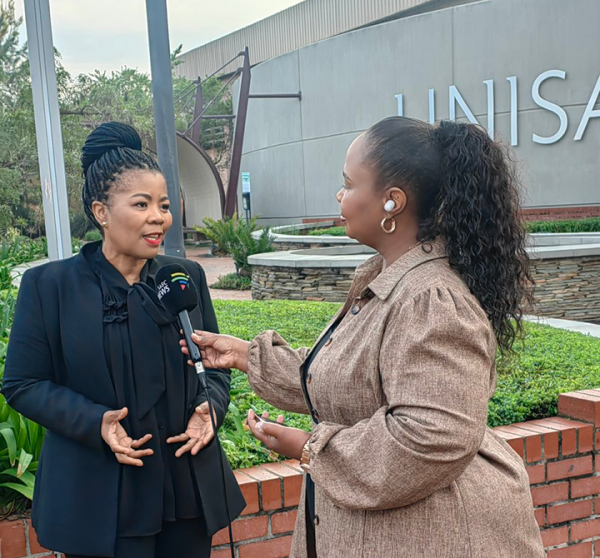
Prof Puleng LenkaBula in conversation with Morning Live’s Sakina Kamwendo on Unisa’s catalytic niche areas
"Reading about Unisa would make one assume that one knows about the institution, until one starts peeling back the layers and realising that there’s so much more to the university," said Sakina Kamwendo, Morning Live presenter, as she reported live from the Unisa Science Campus. "Science, innovation and technology at Unisa. Most would think, where? And when did this happen? When one thinks of Unisa, the immediate thought is that of qualifications offered in humanities, law and education," she added. The Morning Live team's visit to the Unisa Science Campus provided alternative perspectives and a look at the university’s quest to undertake cutting-edge research into, among others, cancer treatment, nanotechnology and water sustainability. Also in the spotlight were the 10 catalytic niche areas set by the university in response to the National Development Plan, Sustainable Development Goals, and Africa’s Agenda 2063.
Speaking on Morning Live, Prof Puleng LenkaBula, Unisa Principal and Vice-Chancellor (VC), shared that the university receives more than 1,2 million applications yearly, with an annual enrolment of about 400 000 undergraduate and postgraduate students. "Unisa is the science diplomat of the country, meaning that we have a footprint in 130 countries from where we recruit our students," said LenkaBula. "This allows us to demonstrate the best of South Africa’s knowledge and the best of science in Africa to the world."
She added: "Excellence is our business, and we are truly committed to shaping futures, ensuring that South Africans and global citizens look at Unisa as a site of excellence, knowledge and research."
Unisa is an online, distance and contact university. It was one of the first universities in the world to implement distance education at university level, and it taught the world how to teach science, engineering and innovation at a distance.
The VC explained that the university has recognised that the sciences are important for any country's competitiveness. As such, the university decided to institute and absorb 10 catalytic niche areas to advance research and innovation. It allows students access to diverse knowledge that they can use in the 21st century with its convergence of innovation and technologies.
"Catalytic niche areas," she said, "are areas of research that we have deemed important for the country to invest in, and our scholars are looking into those areas."
These niche areas of research include marine studies, aviation and aeronautical studies, automotive studies, energy studies, space studies and the Square Kilometre Array, the Fourth Industrial Revolution and digitalisation, biotechnological studies, health/pharmaceutical studies, feminist/womanist/Bosadi theorisations, and student support and co-curricular activities.
All of the identified areas reaffirm Unisa’s commitment to tackling contemporary challenges that societies face. "Unisa," said the VC, "is the only university in the country that is participating in the African BioGenome Project, which entails the sequencing of biogenetic materials of fauna and flora for the continent and probing into how we conserve our own biodiversity in the context of ecological degradation and climatic changes."
During the site visit by the Morning Live team to the Unisa Science Campus laboratories, Prof Thabo Nkambule, Head of the Institute for Nanotechnology and Water Sustainability (iNanoWS) at Unisa, provided insights into the work undertaken by the institute in addressing the country’s current and emerging water quality and water scarcity concerns while providing training to master’s and doctoral students.
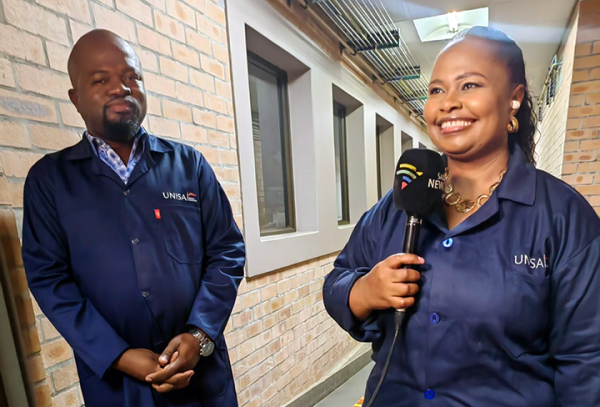
Prof Thabo Nkambule, Head of the Institute for Nanotechnology and Water Sustainability at Unisa, in conversation with Sakina Kamwendo
"iNanoWS at Unisa is at the forefront of advancing its innovative solutions towards addressing the country’s water concerns," said Nkambule. "In our endeavours, we also adopt advances of the Fourth Industrial Revolution, digitalisation and energy, while tackling research related to the marine sciences."
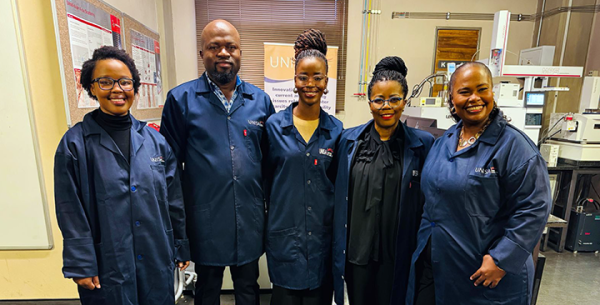
The iNanoWS team with Prof Puleng LenkaBula and Sakina Kamwendo
The research approach adopted by iNanoWS presents the convergence of three of Unisa’s catalytic niche areas while addressing society’s water concerns. The research institute infuses the use of conventional and innovative technologies that will help to provide alternative water resources and ensure that such water is treated to acceptable levels suitable for its intended purpose, for example, drinking or any non-potable use, such as industrial, agricultural or groundwater discharge.
Two postgraduate students from iNanoWS, doctoral student Ratanang Mlaba-Zwane and master’s student Nompumelelo Simamane, also had an opportunity to showcase their research projects to the Morning Live team. Mlaba-Zwane’s work looks at combining passive samplers and conducting bioassay measurements to assess the quality of water, while Simamane focuses on developing nanomaterials for the removal of antibiotics from water while addressing water contamination and environmental safety.
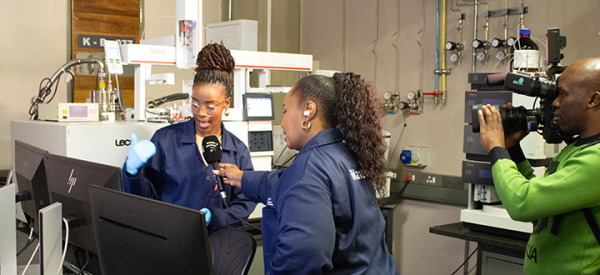
Ratanang Mlaba Zwane, PhD student at iNanoWS, talks about her research on assessing the quality of water
Speaking on biotechnology research as one of the 10 catalytic niche areas at Unisa, Prof Monde Ntwasa from the College of Agriculture and Environmental Sciences shared insights on the anti-cancer drug discovery work that his research group is undertaking. The group has also branched out into looking at research on infectious diseases. He said: "We started working on these research projects about 10 years ago, but within a short space of time, we have managed to contribute to 1% of the university’s innovation endeavours."
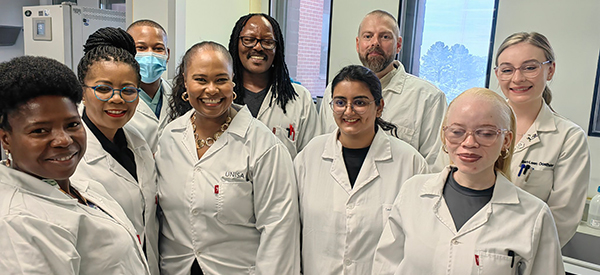
The biotechnology research group with Prof Puleng LenkaBula and Sakina Kamwendo
He continued, "This has been attainable because of the serious investment made by the university in terms of securing state-of-the-art equipment that allows us to conduct competitive research."
Sibusiso Malindisa, a PhD candidate and biotechnology lecturer, demonstrated a one-of-its-kind biotechnology instrument, referred to as the Jess Automated Western Blot System, that he uses for his research to assess what mechanisms and pathways administered drugs use in the treatment of cancer cells.
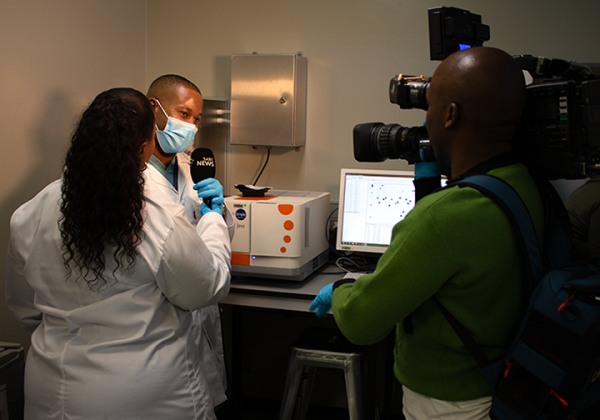
Sibusiso Malindisa, biotechnology lecturer at Unisa and PhD candidate, talks about his research work
Unisa has made science a priority and has therefore made a huge investment in developing a science campus with modern state-of-the-art facilities, some of which are the only of their kind in Africa. The availability of such infrastructure provides Unisa students with an enabling environment for advancing science, engineering, and innovation knowledge that is nationally responsive and globally relevant.
#UnisasCatalyticNicheAreas
* By Dr Nozipho N Madzivha, Communication and Marketing Specialist (acting), College of Science, Engineering and Technology
Publish date: 2025-04-09 00:00:00.0